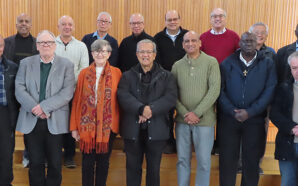This article was originally published in the July 2019 edition of the Melbourne Catholic Magazine.
The latest Australian National Census revealed that for the first time in history, the proportion of Australians who say they have ‘no religion’ (30 per cent) overtook those of any religion. Between 2011 and 2016, Australia saw a decline of nearly 600,000 people who identify as Anglican and 147,500 who identify as Catholic. But Alpha tells a different story.
Bucking the trend of religious decline, Alpha Australia this year celebrated the 500,000th Australian to have explored questions of life, meaning and faith in Jesus. Alpha—the trans-denominational program inviting people into a personal relationship with Jesus—has many fans in Catholic leadership including Pope Francis, numerous cardinals and archbishops, including Archbishops Peter A Comensoli and Mark Coleridge.
Alpha consists of a number of sessions where people eat, watch a talk, and discuss their views. Sounds innocuous enough. But Alpha has come to be one of the few major success stories in both Catholic and Protestant traditions of Christianity in the west over the last few decades.
High profile fans include television’s Bear Grylls and former British PM Tony Blair. Comedian Russell Brand has attended. Since its inception in London, Alpha has gone from strength to strength while in western countries, non-Pentecostal forms of Christianity have experienced an almost universal decline. Melbourne Catholic speaks to Alpha Australia’s National Director Melinda Dwight to explore how Alpha is scratching the world’s spiritual itch so successfully.
Melbourne Catholic: What is it about Alpha that makes Christianity seem so attractive and fresh?
Melinda Dwight: Alpha is a series of discussions. We have some food, we watch a talk and we chat. Our research says that 49 per cent of Australians never get to have a spiritual conversation. Around 13 million Australians say they’re Christian. There are five million people that identify as Catholic in Australia, and yet less than a million of them go to Mass on any particular weekend. So there’s a real interest in Christianity, but there are few opportunities to have spiritual conversations, and there are some barriers to entry to the Church.
So how does someone come to attend Alpha?
Alpha works primarily on invitation. People invite their friends and after coming along one week they might say, ‘Wow, who is Jesus? I haven’t had time to talk about that.’ People are increasingly interested in spiritual things but perhaps have blockages to organised religion.
So Alpha helps people find a place to talk about these things. Fundamentally it’s about community. I’m invited to have dinner and connect with people with different views to mine, but we’re having good robust dinner party conversations, which again is something that’s a bit lacking in our society today.
Do you think that’s a large part of what makes Alpha so attractive? Giving people permission to ask the big questions and discuss them freely?
While we’re increasingly connected with our followers on social media, we’re increasingly disconnected face-to-face. Alpha is a bit like a communal table at a café, except we’re actually talking to each other. You’re surrounded by people and you’re connecting around mutual discussion topics, and you’ve got a basis for that discussion. It’s the opportunity to discuss questions, but really it’s not about answers. I’ve been following Jesus for decades, and I have unanswered questions. Faith doesn’t require all our questions to be answered, but it does mean that we want to have that opportunity to connect.
Having permission to connect with people and talk to strangers is an appealing notion, especially in Melbourne where talking to strangers is often something of a social taboo.
It’s really important, and while we have had Bear Grylls in advertising campaigns, the primary way people come to Alpha is still that someone they know and trust invited them. That personal invitation is really important. One of our statistics says that 70 per cent of Australians pray. That means seven out of 10 people in Australia are praying but they don’t talk about it. There’s interest in spirituality, and there’s interest in taking opportunities to have those conversations. People aren’t sitting down at the pub saying, ‘So what do you think about the Resurrection?’ But if we give them the space and the opportunity, they all have questions they’d like to discuss.
It’s probably quite easy to live your entire life without ever really engaging with anyone on those questions.
And it’s so important. In society we’re obsessed with mental health and physical health, so it’s okay then to ask, ‘What about spiritual health?’ We just have to use language that’s accessible. If you say to a friend, ‘Would you like to come and have a discussion on the Kerygma before catechism?’ they might say, ‘I don’t think so.’ But if you say, ‘Do you have any questions about God, life and faith?’ they might say ‘yes’.
It’s a compelling idea, a person’s spiritual health being considered as a metric of overall wellbeing alongside mental and physical health. What other factors are in play that might make Alpha successful at this time?
In times of challenge and crisis, we all want to go back to basics. I remember being at the Sydney Archdiocese when we first started running training for Catholic parishes, and it was the weekend the Royal Commission was launched. The then Bishop Comensoli and Bishop Porteous were saying, ‘I can’t believe we’ve got 100 Catholic leaders here doing this on this weekend!’ I think it was really encouraging for them that, in the midst of what is huge turmoil for the clergy and the Church, there were faithful people who still said, ‘Let’s go back to our core mission; let’s go back to basics.’
Where did Alpha begin?
Alpha began at the small Anglican Parish of Holy Trinity Brompton (HTB) in London. They realised that in our secular society, not everybody has a foundation of faith. Not everybody has attended Church, so they have questions.
Alpha is helpful because it goes back to the basics of our faith. It goes back to the core of the Gospel that we all agree on. It explores questions like ‘Who is Jesus?’, ‘Why did Jesus die?’, ‘How and why do I pray?’ You can’t underestimate how much Australians like the fact that Alpha is promoted and run by the Catholic Church and the Anglican Church and the Pentecostal Church. People really want to celebrate what we’re all for, rather than focus on our differences.
Our differences matter greatly to us in our tribes, but they don’t really matter to the person who is just wanting to find out who Jesus is, and what prayer is.
There’s something in all of us that cries out to God, something in all of us that says there must be more than this, and so I think people want an opportunity to explore that.
Alpha doesn’t guarantee that people come to faith. I did a session with a group of Muslim men. They didn’t come to faith, but they found out much more about prayer and who Jesus was. We’re not trying to brainwash people; it genuinely is a journey of exploration.
Alpha is great for cradle Catholics who want to renew and grow their faith. It is also designed for people of no faith background, and is therefore a great way for parishes to reach out and evangelise. Alpha’s focus on hospitality, friendship and fun creates an environment that gives people an opportunity to know more about God and who Jesus is.
You said there are a lot of Catholic leaders who are supportive of Alpha. How would you address any fears readers might have about Alpha’s compatibility with Catholic teaching?
Firstly, the Pope is on the Alpha film series.
That’s a good start.
There are other key Catholic leaders on the Alpha film series. One of the things that’s been most helpful in Australia is a book called Divine Renovation by Fr James Mallon—a Catholic Parish Priest and theologian. It describes how they used Alpha to help transform their parish in Halifax, Nova Scotia. Now over 150 Parishes in Australia run Alpha. They use Alpha to bring people into a new or renewed relationship with Jesus, to grow missionary disciples and to create a culture of welcome and hospitality. They tell some exciting stories of faith and of lives transformed.
Can you expand on how this feeds into the wider Church?
Obviously everything goes through the bishop and then through the parish priest. A number of dioceses in Australia are actively promoting and encouraging Alpha. Fr James Mallon and Ron Huntley from Divine Renovation ministry have come to Australia at the invitation of Catholic dioceses to speak to clergy and lay people. At these events, people talk about how Alpha has helped their parish or diocese. The number one response—and this is just my impression—is hope. That sense of being handed a Catholic framework that can really bring hope for reinventing a parish or diocese.
The book Divine Renovation addresses the period after Alpha, within a framework of catechesis, Connect Groups, ministry, service and sacraments. One of the key questions here is: how can we use Alpha to help our parishes develop a more welcoming culture which intentionally grows missionary disciples who are excited about and engaged in their faith?
One of the major things that stood out in the global press on Alpha is that the culture is very welcoming. Russell Brand commented on the lack of judgment and the inclusivity.
It’s about allowing people to explore and follow Jesus rather than trying to compel them to. It’s an important distinction. And acceptance is a key part of that. If you think about old-fashioned dinner parties, the discussion was heated but everyone went away friends and wanting to come back the following week. It isn’t a debate that turns nasty.
Having a discussion in which people can debate ideas without tempers rising is something we don’t see as much; the ability to disagree without that equating to personal hatred.
Such an important component of Alpha is team training, and frankly, most of our training is about how to invite and then how to create that welcoming culture.
So how can someone set up Alpha at their parish?
Our Alpha in a Catholic Context Coordinator, who is experienced in running Alpha in Catholic parishes, is available to assist any parish who would like to get started. We are able to provide advice on how to set up and train your team and also many hints about running an effective Alpha process. We usually run training in collaboration with dioceses.
Our aim is to serve the church, so Alpha is free. Everything you need to run and promote your Alpha is online and downloadable. We don’t charge for training. We give away free outdoor banners for outside the Church, too.
If you would like to attend an Alpha near you, visit https://australia.alpha.org/try
If you would like advice on starting an Alpha in your parish, the Alpha in a Catholic Context Coordinator can be contacted at: lorraine.mccarthy@alpha.org.au. Lorraine would love to hear from you.
With thanks to Melbourne Catholic Magazine and the Archdiocese of Melbourne.








